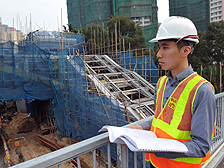
Constructive lessons:
Godwin Liu had the opportunity to tour major infrastructure projects in Beijing when he studied at Tsinghua University. He now works as a civil engineer with the Hong Kong Government.
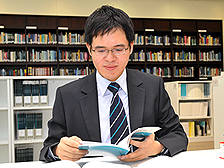
Global insight:
Michael Law says studying International Relations and Economics at Peking University helped him understand multinational relations from a macro perspective.
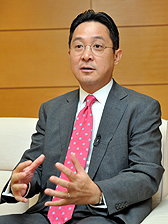
Stress relief:
Under Secretary for Education Kenneth Chen said the pilot scheme provides an alternative route for Hong Kong students, and relieves some stress in gaining university entry.
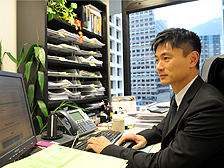
Work advantages:
Executive search agency senior client partner TT Ho said engineering and commerce graduates would have an edge in finding jobs in the Mainland.
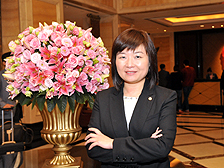
Expert advice:
Hotel vice president Sharon Cheng suggests students practise their use of English, and undertake summer internships or part-time jobs in the Mainland.
Mainland studies improve prospects
December 04, 2011
Godwin Liu graduated from Beijing’s Tsinghua University in 2009 with a degree in Civil Engineering. With his "5A" results in the Hong Kong Certificate of Education Examination, Mr Liu was admitted to the university when he finished Form 6 in 2005 - without having to take the Joint Entrance Examination for Universities in the Mainland.
He went to the UK to earn a Master’s degree, and returned to Hong Kong in 2010 to take up a post with the Highways Department.
Mr Liu encountered many challenges when he stepped onto the Tsinghua campus. The teaching medium was new, and people he encountered had different eating habits and tastes. It took several months to adapt to the changes, but he had the full support of his classmates who became good friends.
"We lived together in the dormitory. When I encountered problems, I could seek help from them," Mr Liu said.
In everyday conversation, the students got to learn more about each other’s lives.
“I wanted to know more about the different areas in the Mainland and the Mainland students were interested in knowing the latest situation of Hong Kong,” Mr Liu said. “It facilitated very good exchanges of ideas between Hong Kong and Mainland students.”
He also joined in university activities, to get fresh perspectives on the local way of life.
In his first year, he spent a week of his summer break in remote Shannxi province, as a volunteer primary school teacher. This provided first-hand experience of life in the nation’s less developed areas.
“If you do your undergraduate [studies] in Hong Kong, it is difficult for you to have this kind of exposure,” he said.
Well connected
Michael Law grew up as a fan of Chinese culture, learning Erhu and calligraphy in primary school. His dream of studying in the motherland came true in 2004 when he enrolled in Peking University, to undertake a double major of International Relations and Economics.
“I understand China better, not just the economy or politics, but also the people and the culture,” Mr Law says, adding that would have been difficult to achieve if he had studied in Hong Kong or overseas.
Although he graduated three years ago, he still feels closely connected to China and his friends on the Mainland.
He now works for the Hong Kong Monetary Authority, mainly responsible for matters concerning Hong Kong’s participation in international financial organisations.
“My experience in Peking University helped me to think from a macro perspective, to understand the relations between different countries and economies,” Mr Law said.
Pilot scheme
The Ministry of Education recently announced a pilot scheme in which 63 Mainland higher education institutions will consider admitting Hong Kong students based on their results in the Hong Kong Diploma of Secondary Education Examinations and the Hong Kong Advanced Level Examination, exempting them from taking the Joint Entrance Examination for Universities in the Mainland.
Vice Premier Li Keqiang announced the scheme during his visit to Hong Kong in August.
The participating institutions are in 11 Mainland provinces and municipalities and offer a wide variety of programmes. Candidates sitting for the HKDSE and the HKALE in 2012 are eligible for the scheme.
Under Secretary for Education Kenneth Chen said it provided an alternative route for Hong Kong students, and relieves some stress in gaining university entry.
“Obviously, if our students need only to focus on one public examination, the pressure would be greatly alleviated,” he said. He added Mainland universities offer a greater variety of subjects, disciplines and courses for Hong Kong students to pursue, opening up new possibilities for them.
Expert advice
Hotel vice president Sharon Cheng said graduates who studied in the Mainland tend to be more mature. “People from different parts of China became their classmates and they have a chance to know the differences among people. They know how to think from the angle of other people. When they are in the working environment, they would be more independent.”
She said while students can easily improve their Putonghua in Mainland universities, they should also practise their use of English. Since Mainland universities stress knowledge and theory, Hong Kong students should undertake summer internships or part-time jobs, to use the knowledge they gain in the real working environment.